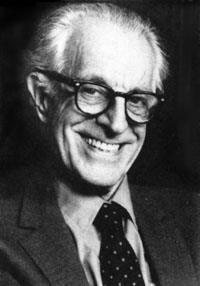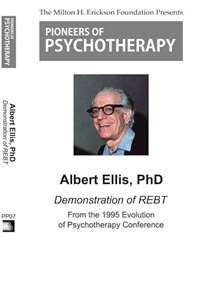Albert Ellis, PhD - Demonstration of REBT, 12/15/1995, Video Stream More info »
Albert Ellis, PhD - Demonstration of REBT
- Average Rating:
- Not yet rated
- Topic Areas:
- Clinical Demonstrations | Rational Emotive Behavior Therapy (REBT) | Homework | Humor
- Categories:
- Pioneers of Psychotherapy | Evolution of Psychotherapy | Evolution of Psychotherapy 1995
- Faculty:
- Albert Ellis, PhD
- Course Levels:
- Master Degree or Higher in Health-Related Field
- Duration:
- 01:01:00
- Copyright:
-
Dec 15, 1995
- Publisher:
- The Milton H. Erickson Foundation Press
- License:
- Never Expires.
Tags: REBT Homework Humor Albert Ellis
Description
Description:
Ellis and Wolfe (1995) demonstrate with several volunteers. Beth, is troubled by her dominating mother. Ellis assigns a homework task. Next, Wolfe works with a volunteer who feels betrayed by her husband and brother. Ellis works with a second volunteer, Megan, who is ending a relationship with her boyfriend. Ellis uses imagery, confrontation and humor.
From conference EP95-CD13-DVD
Educational Objectives:
- To list three of the main techniques of Rational Emotive Behavior Therapy (REBT).
- To experiment with some of these techniques.
*Sessions may be edited for content and to preserve confidentiality*
Credits
Faculty

Albert Ellis, PhD Related Seminars and Products
Albert Ellis, PhD, was an American psychologist who in 1955 developed Rational Emotive Behavior Therapy (REBT). He held M.A. and Ph.D. degrees in clinical psychology from Columbia University and American Board of Professional Psychology (ABPP). He also founded and was the President of the New York City-based Albert Ellis Institute for decades.
He is generally considered to be one of the originators of the cognitive revolutionary paradigm shift in psychotherapy and one of the founders of cognitive-behavioral therapies.[2]
Based on a 1982 professional survey of US and Canadian psychologists, he was considered as the second most influential psychotherapist in history (Carl Rogers ranked first in the survey; Sigmund Freud was ranked third).[3][4] Psychology Today noted, "No individual—not even Freud himself—has had a greater impact on modern psychotherapy."[5]


